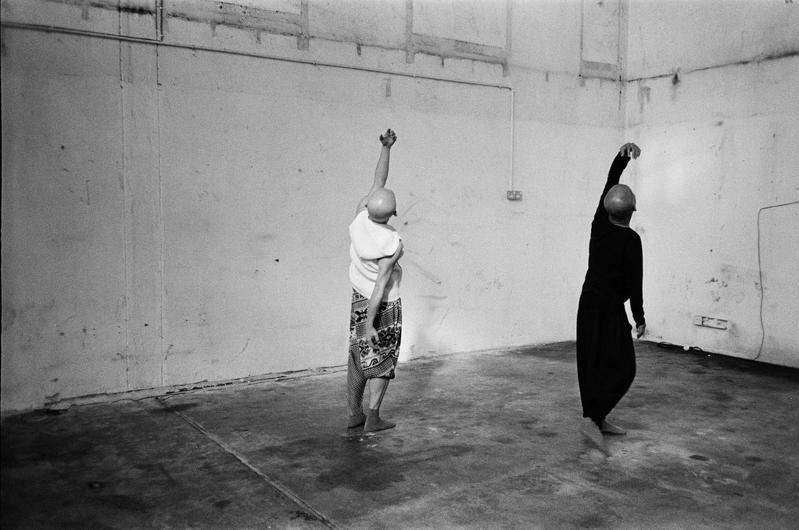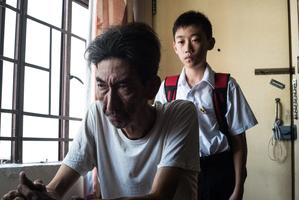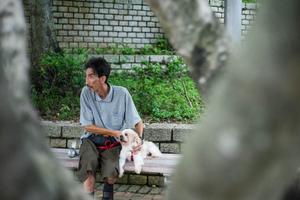Mathew Scott reports on 25 years of ifva — a Hong Kong Arts Centre-hosted festival of short films, video and new media art from across Asia — celebrating its 25th anniversary in the pandemic year.
 Jessey Tsang’s Ward 11, delineating the relationship between two male dancers, picked up the Silver Award at this year’s ifva. (PHOTO PROVIDED TO CHINA DAILY)
Jessey Tsang’s Ward 11, delineating the relationship between two male dancers, picked up the Silver Award at this year’s ifva. (PHOTO PROVIDED TO CHINA DAILY)
The Incubator for Film and Visual Media in Asia (ifva), hosted by Hong Kong Arts Centre, has for 25 years rolled with all the challenges thrown at the Hong Kong film industry, including dwindling box office receipts for local films and a drop in production numbers as investors look north to the Chinese mainland and elsewhere for returns on their riches.
Through annual festival and awards, ifva has extended its reach along the way, expanding its program from the exclusively local short films it focused on in the early days to take in films from around Asia, as well as animation.
Like film festivals everywhere, though, what ifva has faced in 2020 has been unprecedented. As the coronavirus crisis has locked the city down, large gatherings were banned — and simply unwise before they were — and both cinemas and film productions shut down.
Ifva was forced to cancel this year’s event, originally scheduled for early March, despite receiving nearly 1,900 entries from across 40 Asian countries. The health emergency has forced a re-think, globally, in terms of how events are staged, and how an audience is reached.
“This recent coronavirus situation has reminded everyone about the potential uses of technology and new media,” says ifva director Kattie Fan. “A location-based event like a traditional festival is no longer the only way to reach audiences.”
 Director Ryan Chan channeled elements from his own life experiences in Old Man and a Dog. (PHOTO PROVIDED TO CHINA DAILY)
Director Ryan Chan channeled elements from his own life experiences in Old Man and a Dog. (PHOTO PROVIDED TO CHINA DAILY)
Just how that plays out in the long run remains to be seen. Some festivals — such as New Zealand’s Doc Edge — have already made the move to online-only. But Fan suggests a more likely endgame for festivals in general is a happy medium between the new normal and traditional theater screenings.
As the virus forced alterations to plans for this year’s ifva festival and awards, Fan and her team moved screening online and provided a recorded video program to schools.
“Online is one of the options, or part of the strategies, but this is not the only way out,” she says. “Not all programs are suitable to do online, no matter whether they are live or previously recorded. Being there leads to a more meaningful engagement and memories than remote participation.
“In the long run, it requires all-rounded program planning instead of just putting things on the internet. The online and offline should connect in a tighter way too. We are looking into possibilities.”
Ifva now hopes to screen this year’s award winners for the public once life in Hong Kong returns to some sort of normalcy and they also hope to stage a belated celebration to mark their 25th anniversary.
 Adopting a dog helps strengthen family ties in Ryan Chan’s Old Man and a Dog, which won ifva’s Gold Award. (PHOTO PROVIDED TO CHINA DAILY)
Adopting a dog helps strengthen family ties in Ryan Chan’s Old Man and a Dog, which won ifva’s Gold Award. (PHOTO PROVIDED TO CHINA DAILY)
Caring is sharing
The festival has long championed films that are distinctly personal for filmmakers and 2020 has followed this course.
For example, Open Section Gold Award-winner Ryan Chan Hon-yan didn’t have to look far for inspiration for his short Old Man and a Dog. In fact it was sitting right there in front of him every single day.
Chan had adopted two cats since moving to Taiwan to live on his own a few years back and the bond formed between them all had set the filmmaker to thinking about such weighty issues as mortality.
“When I was taking care of my two cats, I started to feel that I may have overcome my fear of imagining death,” says Chan. “It does not necessarily mean that I am not afraid of dying, nor do I mean I am not scared about my cats’ deaths, but I have a better understanding of the mortality of our partners and pets, so I would not now avoid this matter deliberately.”
Chan’s tender, reflective 30-minute film follows a dying man who forms a bond with an abandoned dog and through this connection begins to reconnect with his own family.
 Director Jessey Tsang says ifva plays a very special role in giving filmmakers from Asia a global platform. (PHOTO PROVIDED TO CHINA DAILY)
Director Jessey Tsang says ifva plays a very special role in giving filmmakers from Asia a global platform. (PHOTO PROVIDED TO CHINA DAILY)
“Hong Kong has always been a city that emphasizes cost-effectiveness, and we usually don’t have much time to calm ourselves down and to really think about what we need,” says Chan. “It is hoped that this short film might provide room for the imagination of our audience, and perhaps help them to discover more apart from the despair through the character’s hopelessness.”
Past winners of ifva’s Gold Award have shown their films in the likes of the Annecy International Animation Festival in France, taking advantage of the opportunity to mingle with filmmakers on the other side of the planet. Chan says the festival “encourages filmmakers of different genres to learn and share their imagination”.
“We’ve evolved,” explains Fan. “We’re now more than just awards and a festival. We consider ourselves a network for creative talents and a bridge not only within Hong Kong and Asia, but also out to the globe.
“Now we support our award winners in different ways, from distributing their films to overseas festivals and seeking co-production opportunities, to working with them closely in developing new projects.”
 Director Ryan Chan channeled elements from his own life experiences in Old Man and a Dog. (PHOTO PROVIDED TO CHINA DAILY)
Director Ryan Chan channeled elements from his own life experiences in Old Man and a Dog. (PHOTO PROVIDED TO CHINA DAILY)
Dance like a man
Director Jessey Tsang Tsui-shan picked up the Silver Award at this year’s ifva for Ward 11. Although the film is rather different in style to Chan’s, both are informed by very personal sentiments.
“Both of them touch on topics that everyone might encounter in life — illness, old age and death,” says Fan. “It shows that the most powerful way to reach an audience is through the characters’ emotions.”
The richly atmospheric 16-minute Ward 11 bases itself around the art form of modern dance, as reflected through the bonds formed between two male dancers that are professional, personal and sometimes sweetly passionate.
 Ward 11 follows the spiritual journey taken by two dancers, one of whom eventually dies. (PHOTO PROVIDED TO CHINA DAILY)
Ward 11 follows the spiritual journey taken by two dancers, one of whom eventually dies. (PHOTO PROVIDED TO CHINA DAILY)
The film was a two-year labor of love for Tsang, who made a name with 2012’s Big Blue Lake, winning Best New Director at the Hong Kong Film Awards. She developed a close friendship with the pair, and was deeply touched by the tragedy of one of them dying last year.
Tsang says she has long supported the role ifva plays in providing an audience for films that might not otherwise play to the public at large.
“The film is about their love, and a spiritual journey,” says Tsang. “That goes for me too. We formed a spiritual bond and wanted to share this through images. I have supported ifva and been supported by them for many years. What they do is helping the local films and filmmakers go international and that help really is special.”


